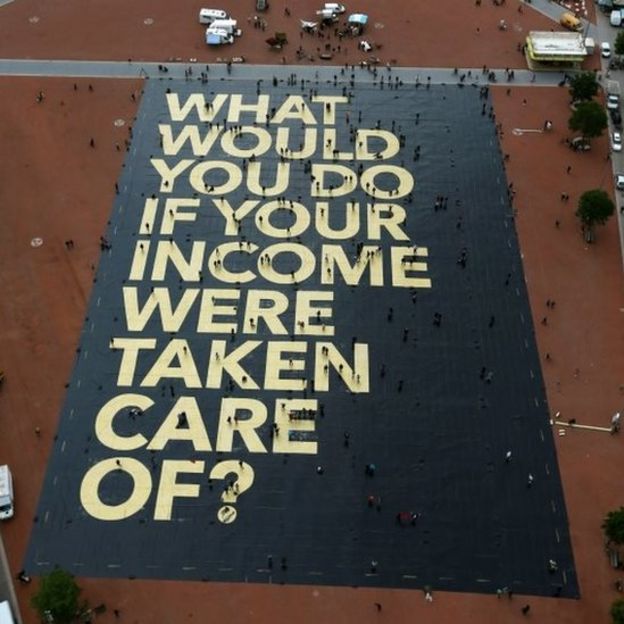
This article is more than
9 year oldSwitzerland's voters rejects basic income plan
Final results f-rom Sunday's referendum showed that nearly 77% opposed the plan, with only 23% backing it.
The proposal had called for adults to be paid an unconditional monthly income, whether they worked or not.
The supporters camp had suggested a monthly income of 2,500 Swiss francs (£1,755; $2,555) for adults and also SFr625 for each child.
The amounts reflected the high cost of living in Switzerland. It is not clear how the plan would have affected people on higher salaries.
The supporters had also argued that since work was increasingly automated, fewer jobs were available for workers.
Switzerland is the first country to hold such a vote.
Intelligent Machines: The jobs robots will steal first
What is artificial intelligence?

REUTERS | Supporters of a basic income last month launched a giant poster campaign
There was little support among Swiss politicians for the idea and not a single parliamentary party came out in favour, but the proposal gathered more than 100,000 signatures and was therefore put to the vote under the Swiss popular initiative system.
Critics of the measure said that disconnecting the link between work done and money earned would have been bad for society.
But Che Wagner f-rom the campaign group Basic Income Switzerland, argued before the vote that it would not be money for nothing.
"In Switzerland over 50% of total work that is done is unpaid. It's care work, it's at home, it's in different communities, so that work would be more valued with a basic income."
The popular initiative system
- Allows citizens to suggest changes to the federal constitution
- All initiatives that gather 100,000 signatures in 18 months go to a public vote
- A constitutional amendment by initiative not only requires a majority public vote but a majority of cantons must also approve it
- Differs f-rom the mandatory referendum, which is called by parliament and does not need public signatures
Meanwhile, Luzi Stamm, a member of parliament for the right-wing Swiss People's Party, opposed the idea.
"Theoretically, if Switzerland were an island, the answer is yes. But with open borders, it's a total impossibility, especially for Switzerland, with a high living standard," he said.
"If you would offer every individual a Swiss amount of money, you would have billions of people who would try to move into Switzerland."
The wording on the initiative was vague, asking for a constitutional change to "guarantee the introduction of an unconditional basic income" but with no mention of amounts.
The idea is also under consideration elsewhe-re. In Finland, the government is considering a trial to give basic income to about 8,000 people f-rom low-income groups.
And in the Dutch city of Utrecht is also developing a pilot project which will begin in January 2017.
Another four issues were on the Swiss ballot on Sunday.
- A proposal to speed up the country's asylum process was backed by nearly 67%
- The Pro Service Public initiative proposing that bosses of big public sector companies should not earn more than government ministers - a reflection of dissatisfaction with railways and telecoms provider Swisscom. It was rejected by 68% of the voters
- A proposal to allow genetic testing of embryos before they are in-serted in the uterus in cases of in-vitro fertilisation, whe-re either parent carries a serious hereditary disease. It was passed, with 62% backing it
- Transport financing: An initiative f-rom the car lobby which wants more investment in roads. The government had urged a "No" vote, and it was rejected by 71%.




